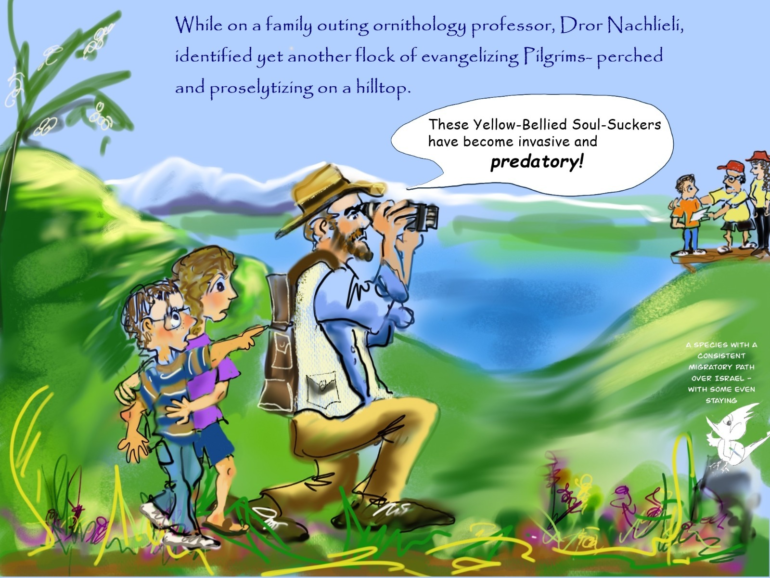“The worldwide mission of the Christian church is rooted in the Incarnation and is part of God’s redemptive purpose for the world. God is a missionary God. The Bible is a missionary book. The gospel is a missionary message. The church is a missionary institution. And when the church ceases to be missionary minded, it has denied its faith and betrayed its trust.”
Understanding Christian Missions by J. Herbert Kane (a textbook used for missionary classes in Evangelical Bible colleges)
When Theology Becomes Parasitic
There are over 300 organizations and agencies inside the State of Israel dedicated to converting Jews to a belief in Jesus, and 200 online organizations, with over 30,000 Israeli converts, a number that has doubled in the last 5 years. Evangelical Christians want to see themselves grafted onto the Jewish people and into Israel and to see us as “one new man under Christ.” (see Galatians 3:28, Romans 11:19, Ephesians 2:15)
But what about the social and psychological harm to the people of Israel and the pathology of these conversionary efforts?
Bear with me as we take a psycho-allegorical look at the forest, the trees and a disturbing side of human nature…
While hiking through the Sierra Nevada mountains, we proceeded through partially uncharted territory. We noticed that the typically elegant firs and vibrant spruces seemed sickly. The vivid greens were now pale; their usually statuesque forms now looking bent and broken. The forest floor was covered in decaying and dead branches and trees. The deeper we hiked, the more we observed parts of trees discolored, pale and white. Further on we saw a kind of shrouding, a lace and lattice of sinuous growth across, at first, upper parts of the trees and then, further on, over entire trees. Then, dead trees. An entire dead forest.
What was going on?
The part of the forest we had hiked through was infested with a tree parasite. It feeds on plants and withdraws nutrients from the host. The parasite does not have its own leaves or roots. It wraps itself around the host tree and injects a chemical into the vascular (sap) system of the tree and ultimately kills the foundational root system. This parasite kills entire forests for its own survival.
In the plant and animal world, when one species feeds off another, it is called parasitism.
Parasites rarely kill their “host”- rather they feed off, modify and exploit it in order to survive. A parasite is dependent upon the host for a number of functions so that it does not have to perform these tasks itself. Thus, it reduces the host’s strength and increases its own. Research indicates that in these host-parasite relationships, the parasite changes (in animals) the brain and behavior of the host so that the host will perform important functions for the parasite. And once weakened, the host becomes dependent upon the parasite.
Of course, it’s no secret that microscopic phenomena and behaviors can also manifest themselves in the macroscopic world…
In a recent article, Israeli psychologist Anav Youlevich, Ph.D., was interviewed about her and her colleagues’ project called “Victims of Narcissistic and Psychopathic Abuse.”
“Narcissistic abuse occurs within a relationship where one side doesn’t see the other person at all and doesn’t perceive their needs and desires as legitimate. They think only about what the other side can do for give them, and they use unrelenting manipulation to achieve what they want. The other side is only a tool from their points of view.” (Haaretz, March 12, 2021, “An Anchor for the Abused”)
Dr. Youlevich discusses the concept of “gaslighting,” where the perpetrator – the narcissist – uses all sorts of manipulation to “undermine the legitimacy of the victim’s thoughts and feelings.” This causes the victim to experience confusion, anxiety and inaccurate perceptions about reality.
But there is also the communal narcissist who believes he or she is special to the community around them and deserves special treatment from that community. They see themselves as helpful, trusting and good hearted. They believe they are doing good and are extraordinarily helpful to others. A communal narcissist differs from the typical narcissist in that they use community, social groups, to satisfy themselves rather than personal relationships. They need to feel they are exceptional and are doing exceptional good for the community. They, too, find a means to justify their entitlement to the reverence of others. They believe they have a superior belief system or knowledge.
As in the plant and animal kingdoms, for us humans, narcissists are like parasites. A narcissist is self-deluded, they believe exclusively in themselves, their world view, their needs. However, they need other people to support them for their continued existence. Like the plant or animal parasite, the narcissist is dependent on their “host” – be it in individual or group relationships. And like the parasite, the narcissist works to control their victim.
The parasitic narcissist orchestrates these activities and controls the reality of the victim or victims by seeking others to affirm and support them. They do not feel complete themselves and use others for validation of self-worth. They have an innate instinct and ability for identifying and connecting themselves to “hosts.” And then, the host serves the needs of the narcissist. The host offers the narcissist a form of status and affirmation and justifies their self-serving view of the world and their self-serving behavior.
The “host” – the victim – does not recognize they are being preyed upon. Every narcissist has a host. Every communal narcissist has social hosts. And they both lack empathy for their victim, their host. The parasite/narcissist makes the host/victim feel special, feel good about themselves. They use compliments, fun or extravagant activities, various types of gifts as an inducement to foster dependency that serves to make the host/victim ignore any warning signs of manipulation and control. It starts subtly and is not identifiable at first. The host/victim is being cultivated for dependency on the parasite/narcissist.
There is nothing sacred, holy, benevolent or benign about parasitic or narcissistic behavior.
Keep that in mind as we consider some of the main features characteristic of evangelical missionary behavior in Israel:
- Missionaries have a sense of grandiosity, entitlement, an inflated opinion of self. There is no rational dispute with the theology, there is no critical dialogue, no self-analysis of alternatives versions of their belief system. The Jewish tradition of debate, disputation, dialogue, is a threat and unacceptable to the single-minded theology of an evangelical Christian missionary.
- A missionary needs their “host” – the Jew – as their potential convert. The entire reason for their being a missionary in Israel, their raison d’etre, is to convert Jews (and being a missionary generally pays very well). This gives missionaries their sustenance. Their theology and their purpose are purely dependent upon the Jew’s theology and history of having “missed the boat” of “not believing in Jesus.”
- The missionary causes individual, familial and social harm (disease) to Israelis.
- The missionary modifies their Jewish victim and exploits him or her for their own existence.
- Missionaries believe in their theology so thoroughly that it is unassailable, it is “perfect” and infallible and therefore ignores the social and emotional health of their victim.
- They have little or no empathy for the impact of their efforts that a belief in Jesus will have on the Jewish individual, family, community or state.
- They justify their parasitic behavior by terms such as “freedom of religion” and “marketplace of ideas.”
- They see themselves as helpful, trusting and good hearted. We are “good” Christians.” “We are saving the Jews.” “We are completing Jews.”
- As with the narcissist, any means for achieving their own satisfaction is, for the Christian missionary, acceptable. This includes deception, lying and covert behaviors.
- They believe their life’s mission is the best way for everyone, and their actions and their cause will change the world for the better.
- They do not feel complete themselves and use others for validation of self-worth.
- The targeted Jewish victim offers the narcissistic missionary a form of status and affirmation and justifies their self-serving view of the world and their self-serving behavior.
In reviewing the above dynamics, several American Christian friends have shared with me their opinions about missionary activity in Israel:
“We Christians should think more carefully about, and research for ourselves, the true goals of our faith, and the honest effects on others from our lives and actions. Often there is mere black and white thinking and zeal without a depth of understanding.”
and
“I don’t think for us goyim in the US we are aware of how big of an issue this is for Israelis. Evangelicals, of which I was one in my youth, are at a minimum annoying and naively self-righteous. But they can move into aggressive posturing in which they seek to deny others their religious liberty in the pursuit of their own religious colonialism—all without an iota of irony or humble self-reflection.”
Israelis – as a people with a history of being traumatized, displaced and subjected to physical violence – have no personal, societal or legal defense against this parasitic missionary behavior. And here’s the irony: without Jews, evangelical Christians would have no one, nobody to prey upon. Their acting upon their theology needs Jews to fulfill their theology. No Jews, no return of Jesus, no grafting onto the Jewish people, no “one new man under Christ.”
That is the definition of a parasite.






I’m saving this article, and, sharing it everywhere. Thank you for such an in depth exposition of this disturbing behavior.
An intriguing article with an insightful analysis…. Before I read it, I never really noticed one thing:
The first, and possibly most tragic, victim of the missionary is themselves.
All of the toxic attitudes that missionaries exhibit were first applied to themselves by their so called “community”. The average christian walks around in a 24/7 self-inflicted haze (meaning, an ever present internal dialogue) that they themselves deserve this kind of treatment. (It’s the core, foundational christian tenant that every human being deserves for the christian god to burn them alive for all eternity, but that god is so kind that he will waive the punishment only so long as the christian person demonstrates total devotion. Of course, if that same person ever fails to remain devoted, then their god will revoke the pardon and send them to be tortured for all eternity.)
Any person who accepts that they deserve to be treated in such an inhuman/toxic manner, is likely to treat others that way also. So, it should be no wonder that missionaries then go on to do the same to others and treat their targets as inhuman objects that can be manipulated at the whim and pleasure of the missionary…. After all, that’s how the christian god treats his adherents, so how can one expect any different behavior from his “children.”
I suppose it’s like a child who is sexually abused at the age of 5 and then goes on to do exactly the same to other children. It’s all the child knows, how they have been trained to view themselves and others. Certainly it doesn’t justify them passing the abuse on to another victim. However, it’s interesting to consider that anyone who is a missionary is a daily (moment to moment, in fact) victim of their theology first and foremost.
I guess it’s no surprise that the toxic beliefs they have deeply internalized and applied to themselves would also then be fully applied to others. Christian theology is deeply inhumane. It violates the inherent sanctity and dignity of the individual at the deepest levels of the heart and mind of its adherents. What’s most surprising is that it hasn’t driven a greater percentage of them more crazy than it has!